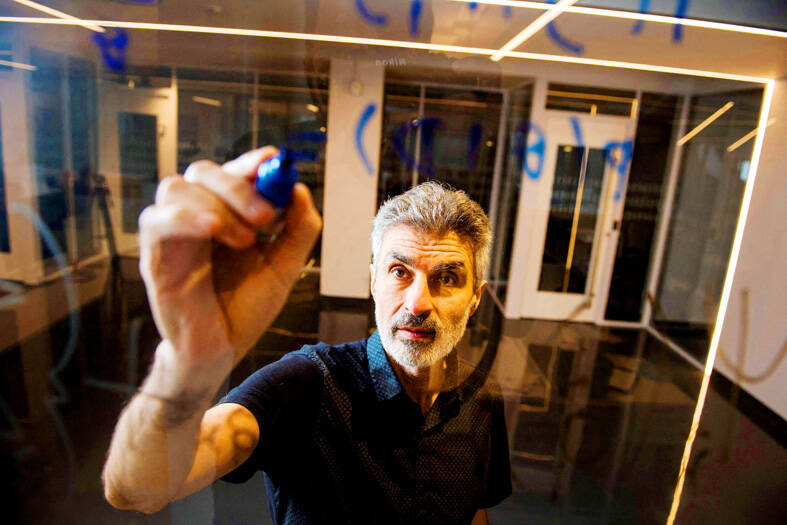Rapid developments in artificial intelligence (AI) and recent turmoil at industry powerhouse OpenAI Inc have brought fresh attention to a key hub of ethics research related to the technology in Montreal, led by Canadian “godfather of AI” Yoshua Bengio.
Bengio — who in 2018 shared the Turing Award with Geoffrey Hinton and Yann LeCun for their work on deep learning — said that he is worried about the technology leapfrogging human intelligence and capabilities in the not-too-distant future.
The academic said that AI developments are moving at breakneck speed and risk “creating a new species capable of making decisions that harm or even endanger humans.”

Photo: AFP
For some time, Bengio has been warning about companies moving too fast without guardrails, “potentially at the public’s expense.”
It is essential to have “rules that’ll be followed by all companies,” he said.
At a world-first AI summit in the UK early last month, Bengio was tasked with leading a team producing an inaugural report on AI safety.
The aim is to set priorities to inform future work on the security of the cutting-edge technology.
The renowned AI academic has brought together a “critical mass of AI researchers” through his Mila-Quebec Artificial Intelligence Institute research institute, located in a former working-class neighborhood of Montreal.
His neighbors include AI research facilities of US tech giants Microsoft Corp, Meta Platforms Inc, IBM Corp and Google.
“This concentration of experts in artificial intelligence, which is greater than anywhere else in the world,” is what attracted Google, said Hugo Larochelle, the hoodie-wearing scientific director of DeepMind, the Silicon Valley giant’s AI subsidiary.
Early on, these researchers began thinking about the future of AI, and consultations with the public and researchers from all disciplines led in 2018 to a global AI charter called the Montreal Declaration for a Responsible Development of Artificial Intelligence.
“We knew early on that the scientific community needed to think about the integration of AI into society,” said Guillaume Macaux, The International Observatory on the Societal Impacts of AI and Digital Technology (OBVIA) vice president.
Its 220 researchers advise on government policies and raise public awareness of the possible positive effects and negative impacts of this cutting-edge technology.
Artists too are playing a part in “demystifying AI,” says Sandra Rodriguez, who splits her time making art in Montreal and teaching digital media at the prestigious Massachusetts Institute of Technology (MIT) in the US.
Her latest art installation includes a breathtaking futuristic world via a virtual reality (VR) headset, which enables visitors to converse with a bot inspired by US linguist Noam Chomsky.
Voice and text answers to queries appear simultaneously. With the touch of a finger, lists of alternative responses considered by the AI with their associated percentage gradient pop up.
“You quickly realize that it’s actually just an algorithm,” Rodriguez said.
“Montreal is a fantastic playground” for exploring the potential and limits of artificial intelligence, as well as “debating [related] ethical and societal issues,” she said.
Art becomes “necessary more than ever” to invite “a wider public to ask questions about the issues of artificial intelligence which will affect them tomorrow,” Rodriguez said.

CHIP RACE: Three years of overbroad export controls drove foreign competitors to pursue their own AI chips, and ‘cost US taxpayers billions of dollars,’ Nvidia said China has figured out the US strategy for allowing it to buy Nvidia Corp’s H200s and is rejecting the artificial intelligence (AI) chip in favor of domestically developed semiconductors, White House AI adviser David Sacks said, citing news reports. US President Donald Trump on Monday said that he would allow shipments of Nvidia’s H200 chips to China, part of an administration effort backed by Sacks to challenge Chinese tech champions such as Huawei Technologies Co (華為) by bringing US competition to their home market. On Friday, Sacks signaled that he was uncertain about whether that approach would work. “They’re rejecting our chips,” Sacks

It is challenging to build infrastructure in much of Europe. Constrained budgets and polarized politics tend to undermine long-term projects, forcing officials to react to emergencies rather than plan for the future. Not in Austria. Today, the country is to officially open its Koralmbahn tunnel, the 5.9 billion euro (US$6.9 billion) centerpiece of a groundbreaking new railway that will eventually run from Poland’s Baltic coast to the Adriatic Sea, transforming travel within Austria and positioning the Alpine nation at the forefront of logistics in Europe. “It is Austria’s biggest socio-economic experiment in over a century,” said Eric Kirschner, an economist at Graz-based Joanneum

BUBBLE? Only a handful of companies are seeing rapid revenue growth and higher valuations, and it is not enough to call the AI trend a transformation, an analyst said Artificial intelligence (AI) is entering a more challenging phase next year as companies move beyond experimentation and begin demanding clear financial returns from a technology that has delivered big gains to only a small group of early adopters, PricewaterhouseCoopers (PwC) Taiwan said yesterday. Most organizations have been able to justify AI investments through cost recovery or modest efficiency gains, but few have achieved meaningful revenue growth or long-term competitive advantage, the consultancy said in its 2026 AI Business Predictions report. This growing performance gap is forcing executives to reconsider how AI is deployed across their organizations, it said. “Many companies

France is developing domestic production of electric vehicle (EV) batteries with an eye on industrial independence, but Asian experts are proving key in launching operations. In the Verkor factory outside the northern city of Dunkirk, which was inaugurated on Thursday, foreign specialists, notably from South Korea and Malaysia, are training the local staff. Verkor is the third battery gigafactory to open in northern France in a region that has become known as “Battery Valley.” At the Automotive Energy Supply Corp (AESC) factory near the city of Douai, where production has been under way for several months, Chinese engineers and technicians supervise French recruits. “They